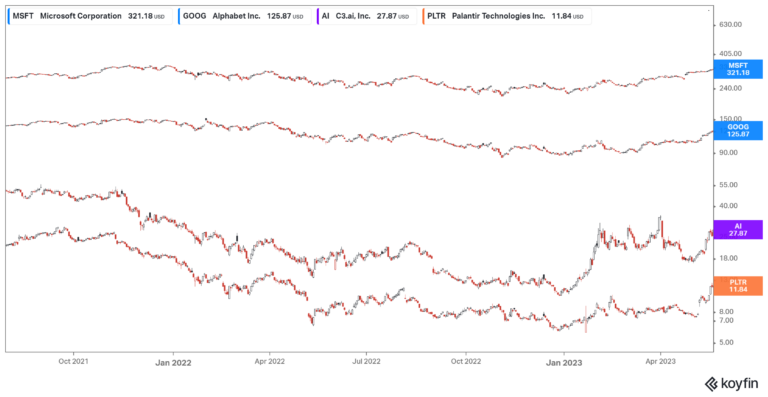
Things to consider when investing in AI
It’s a hot thing right now, but are you sure if it’s your money’s worth?

Artificial intelligence (AI) is one of the most disruptive technologies of our time. It is already having a major impact on our lives, and its potential to change the world is enormous. As AI continues to evolve, it is likely to create new opportunities for businesses and investors.
As far as we are concerned, AI has been making its way from being heavily used by companies to now being utilized by end consumers such as you and me. Many users-interactive AI functions are now being utilized, either for creative writing purposes, image generation, and even speech generation,
If you are interested in investing in AI, there are a few things you need to take note of.
How Are AI Companies Performing in the Market?

AI companies are performing very well in the market. In 2022, the global AI market was valued at $390 billion, and it is expected to reach $1.1 trillion by 2028. This growth is being driven by the increasing adoption of AI by businesses and governments — and even end users.
There are a number of AI companies that are performing particularly well in the market. Some of these companies include (note: this is not a stock suggestion; we are just name-dropping some of the companies involved in the scene):
- Nvidia (NVDA): Nvidia is a leading provider of graphics processing units (GPUs) such as the DGX-2, that are used in a wide range of AI applications. NVIDIA has been ramping up its AI capabilities in the software field as well as the hardware field, which provides it with an upper hand in the industry, as its chips are heavily used in AI developments.
- IBM (IBM): IBM is a global technology company that can be considered one of the leaders in AI research and development. Its realm of research, however, is more centered on enterprise AI uses, specifically in providing foundation models and cloud-native development of AI.
- Microsoft (MSFT): Microsoft is a leading provider of cloud computing services, which are used to power AI applications, as well as its recent venture in OpenAI, the owner of ChatGPT, a generative large language model (LLM) AI provider.
- Amazon (AMZN): Amazon is a leading e-commerce company that is using AI to improve its operations and customer experience. Currently, its AI function is being used to boost its operations, especially in evaluating product availability, optimizing delivery routes and even predicting consumer demands — that, on top of many other ventures, such as its development of Amazon Bedrock, an AI language model.
- Alphabet (GOOG): Alphabet is the parent company of Google, which is currently developing its own LLM model called Bard.
These are just a few of the many AI companies that are performing well in the market. If you are interested in investing in AI, you should consider investing in some of these companies, but make sure to look into other companies as well.
Two Most Common Ways to Invest in AI

There are a number of ways to invest in AI. You can invest in individual AI stocks, or you can invest in AI ETFs.
If you want to invest in individual AI stocks, you need to do your research and choose stocks that you believe are undervalued. You should also consider the risk factors associated with AI stocks. AI stocks are often more volatile than traditional stocks, so you should be prepared for the possibility of losing money.
If you want to invest in AI ETFs, you can choose from a number of ETFs that track the performance of AI stocks. ETFs are a good way to invest in AI if you want to diversify your portfolio and reduce your risk.
Here are some of the most popular AI ETFs:
- Global X Robotics & Artificial Intelligence ETF (BOTZ): BOTZ tracks the performance of the Indxx Global Robotics & Artificial Intelligence Thematic Index, which includes stocks of companies that are involved in the development and commercialization of robotics and artificial intelligence technologies. This ETF’s top holdings include NVIDIA (11.8%), Intuitive Surgical Inc (9.48%), and Keyence Corp (8.05%) as of May 29th, 2023.
- ROBO Global Robotics and Automation Index ETF (ROBO): ROBO tracks the performance of the ROBO Global Robotics and Automation Index, which includes stocks of companies that are involved in the development and commercialization of robotics, automation, and AI (RAAI). As of May 29th, 2023, NVIDIA makes up 2.06% of its asset value,
- ARK Autonomous Technology & Robotics ETF (ARKQ): ARKQ tracks the performance of the ARK Autonomous Technology & Robotics Index, which includes stocks of companies that are involved in the development and commercialization of autonomous technology and robotics technologies. Despite not explicitly mentioning AI, the fund does mention that its goal is to invest in disruptive innovations — which may include AI. Its top holding as of May 29th, 2023, is Tesla which makes up 13.72% of its assets. Tesla incorporates AI in its autonomous driving function, but one could say it’s quite niche.
Things to Look Out for When Investing in AI

Volatility
There are a number of things to look out for when investing in AI. First, you need to When considering investments in AI, it is important to consider several factors. Firstly, one should be mindful of the risks associated with AI stocks. These stocks tend to be more volatile compared to traditional stocks, which means that their value can fluctuate significantly over short periods of time. As an investor, it is crucial to be mentally prepared for the possibility of experiencing financial losses.
Despite that, there are a few companies that are not a hundred percent reliant on AI such as Google (GOOG) or Microsoft (MSFT) which is known for other lines of products and services as well. Some of these companies are moving relatively more stable compared to others that are almost solely reliant on AI, such as C3.AI (AI) or Palantir (PLTR). Take a look at the price graph below.

From these graphs, we can see that the movements in the latter two is more volatile compared to their tech giants counterpart, albeit the price being relatively lower (it might suit your budget better).
Competitive landscape
Secondly, it is essential to stay informed about the competitive landscape within the AI market. Numerous companies are actively developing AI technologies and solutions, so it is important to carefully evaluate and select companies that possess a competitive advantage. This could be in the form of proprietary algorithms, unique datasets, established partnerships, or other factors that differentiate them from their competitors.
Take generative AI, for example, both Microsoft and Google are competing to produce a product that technically caters to the same purposes via Microsoft’s investment in OpenAI, in which its ChatGPT is technically in a direct rivalry with Google’s Bard. All in all, there’s no telling if there would be any losers or winners in that sense, or that if both apps are going to fare well in competition with one another — that is without considering other competitors in the same line.
Long term prospect over short-term fluctuations
Thirdly, investing in AI requires patience. While the potential for AI is immense, it is important to recognize that it is a long-term investment. It often takes several years for AI companies to fully realize their potential and generate substantial returns. Therefore, investors should consider having a long-term perspective and be prepared to hold their investments for an extended period.
Overall, investing in AI can be rewarding, but it also comes with its own set of risks and challenges. Understanding these risks, evaluating the competitive landscape, and having patience are important considerations to make informed investment decisions in the AI sector.
Bottom line
Artificial Intelligence (AI) is indeed a disruptive technology that has the potential to revolutionize various aspects of our lives and change the world as we know it. Investing in AI can be an attractive opportunity for those looking to capitalize on its transformative potential. However, it is important to approach AI investments with thorough research and caution. Here are some key points to consider:
Before investing in AI, it is crucial to gain a comprehensive understanding of the technology, its applications, and its current and future market trends. Familiarize yourself with different AI approaches, such as machine learning, natural language processing, computer vision, and robotics. Stay updated with the latest developments and breakthroughs in the field.
It’s worth noting that AI investments can take various forms, including investing in AI-focused companies, AI-related exchange-traded funds (ETFs), venture capital funds, or even direct investments in AI startups. Each avenue carries its own opportunities and risks, so it’s important to assess your risk tolerance and investment goals before proceeding.
In conclusion, investing in AI requires careful research, a deep understanding of the technology and its market, and a willingness to bear the associated risks. If approached thoughtfully, investing in AI has the potential to be a rewarding experience, offering the chance to contribute to and benefit from the transformative power of this disruptive technology.
Do keep an eye out for our posts by subscribing to our channel and social media.
None of the material above or on our website is to be construed as a solicitation, recommendation or offer to buy or sell any security, financial product or instrument. Investors should carefully consider if the security and/or product is suitable for them in view of their entire investment portfolio. All investing involves risks, including the possible loss of money invested, and past performance does not guarantee future performance.






